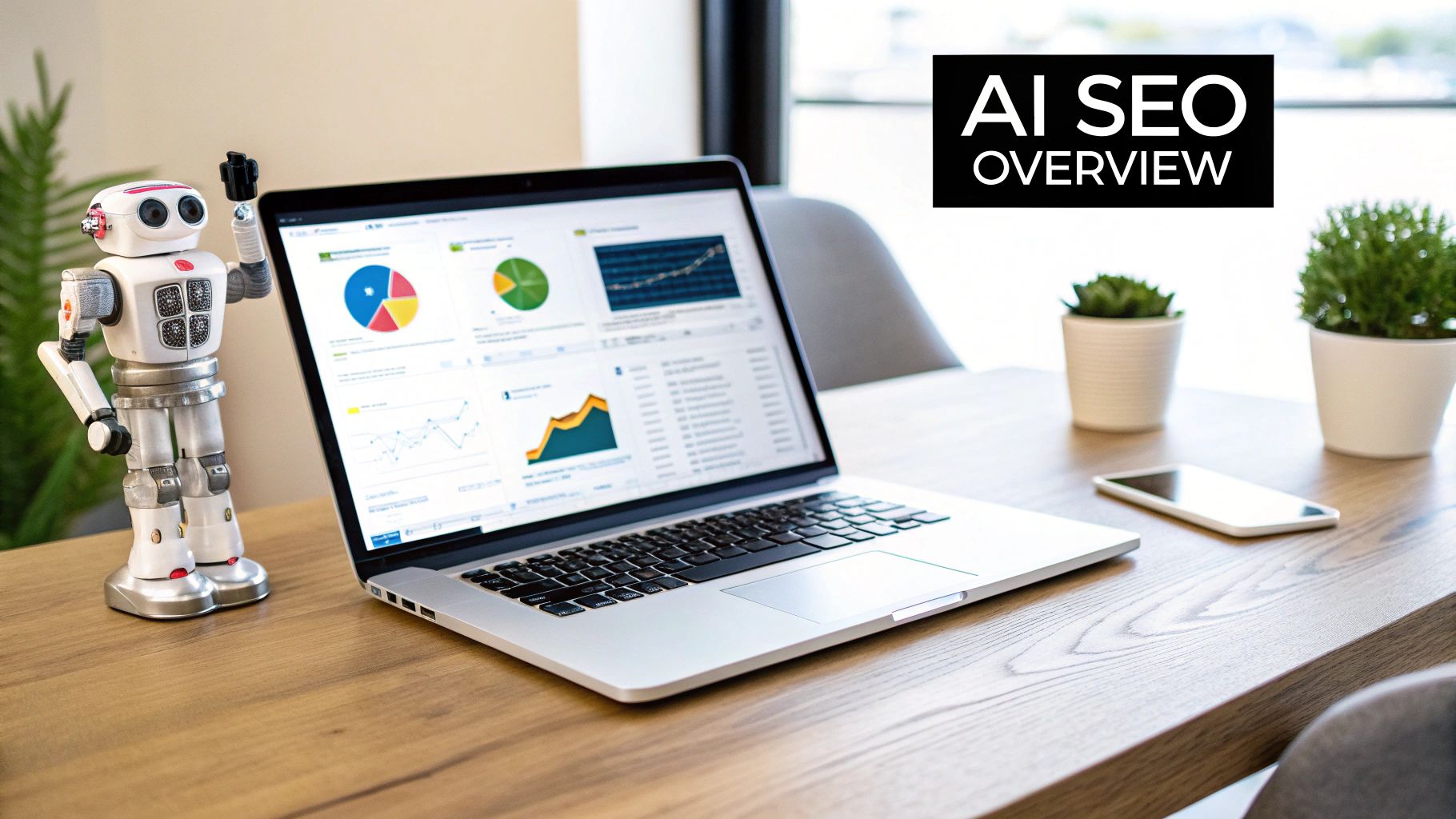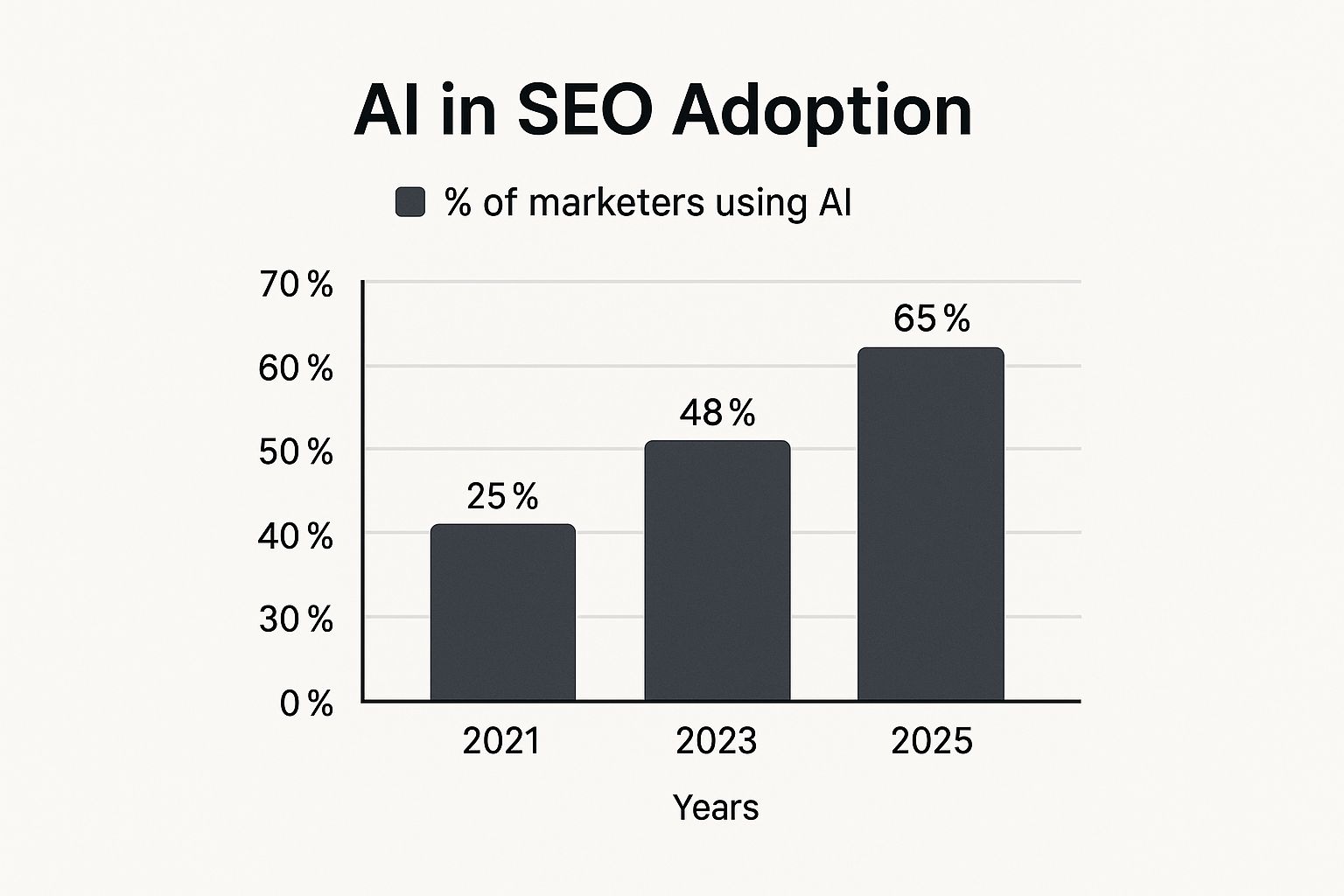AI SEO Guide: Boost Your Search Rankings Effortlessly
Understanding AI SEO: The Game-Changer Your Competition Fears

AI SEO is changing how businesses optimize for search. It's not simply automating existing tasks. It's a fundamental shift in how we approach search visibility. We're moving away from slow, manual processes and embracing intelligent, data-driven strategies that can adapt to the ever-changing search algorithms.
Rethinking Traditional SEO
Traditional SEO often involves manual keyword research, link building, and content creation. These methods can be time-consuming and costly, and often struggle to keep pace with search engine algorithm updates. Think about manually optimizing meta descriptions for hundreds of web pages. AI SEO tools like Semrush can automate this, freeing up your team to focus on higher-level strategies.
The Power of AI-Driven Optimization
AI-powered SEO utilizes machine learning to analyze large datasets. It identifies patterns and predicts trends, offering several important advantages. One key advantage is the ability to personalize content based on user behavior. AI can also automate tasks like keyword research and content optimization, leading to more efficient processes and better results.
Key Benefits of AI SEO
- Data-Driven Insights: AI analyzes significant amounts of data to uncover hidden opportunities and potential problems. This ensures your SEO strategies are based on real information, not guesswork.
- Enhanced Content Creation: AI can help create high-quality, optimized content, from blog posts to product descriptions. This speeds up content production and helps it resonate with your audience.
- Improved Efficiency: Automating routine SEO tasks like keyword research and link building with tools like Ahrefs frees up your team's time for more strategic work. This boosts efficiency and allows you to focus on the bigger picture.
From Manual to Intelligent Optimization
The move to AI SEO represents a shift from manual, reactive SEO strategies to proactive, intelligent ones. Imagine a system that automatically adjusts to algorithm changes, constantly optimizing your site for maximum performance. This is the potential of AI in SEO, helping businesses stay ahead of the competition. The future of SEO is undeniably linked with AI. It's not just a passing trend, but a vital tool for businesses that want to succeed online.
The Explosive Growth Behind AI SEO Investment Surge
The increasing use of AI in SEO isn't just a passing fad. It represents a major change in how businesses optimize for search. This change is driven by significant investment in AI-powered SEO technologies, reshaping the market and opening up exciting possibilities for businesses that embrace these tools.

The infographic above illustrates the rising adoption of AI in SEO. The data shows a jump in AI adoption among marketers from 25% in 2021 to 48% in 2023. Projections indicate this will climb even further to 65% by 2026. This rapid expansion highlights the growing understanding of AI's power to boost SEO performance. For businesses, this means integrating AI into their SEO strategies is crucial to stay competitive.
Market Dynamics Driving AI SEO Investment
Several forces are contributing to the increased investment in AI SEO. One major factor is the need for more efficient and effective SEO processes. Businesses recognize that traditional SEO methods can be slow and require significant effort, making it difficult to keep up in today's fast-paced digital environment. The growing complexity of search engine algorithms also necessitates more advanced tools and strategies. AI-powered solutions are well-suited to address this need.
This demand is reflected in the substantial funding flowing into AI SEO technology. The market for AI SEO software tools is expanding rapidly. Currently, the global market is valued at approximately $1.99 billion. However, it is expected to reach $4.97 billion by 2033. This growth mirrors the rising demand for AI-driven SEO solutions, which empower businesses to optimize their content for both traditional search engines and emerging generative AI platforms like Gemini. You can find more in-depth statistics here: Learn more about AI SEO statistics.
The following table shows projected growth:
| Year | Market Value (Billions) | Growth Rate |
|---|---|---|
| 2024 | $1.99 | - |
| 2026 | $2.21 | 11.1% |
| 2026 | $2.46 | 11.3% |
| 2027 | $2.73 | 11.0% |
| 2028 | $3.02 | 10.6% |
| 2029 | $3.35 | 10.9% |
| 2030 | $3.71 | 10.7% |
| 2031 | $4.10 | 10.5% |
| 2032 | $4.52 | 10.2% |
| 2033 | $4.97 | 9.9% |
As you can see, consistent double-digit growth is expected over the next decade.
The Competitive Advantage of Early Adoption
Businesses that adopt AI SEO technologies early gain a significant competitive edge. They can automate time-consuming tasks, freeing up their teams to concentrate on strategic initiatives. AI-powered tools offer deeper insights into user behavior and search trends, allowing businesses to develop more targeted and effective content.
These insights can lead to several key benefits:
- Improved search rankings
- Increased organic traffic
- Higher conversion rates
The Risks of Delaying AI SEO Implementation
Companies that put off incorporating AI into their SEO strategies face potential downsides. They might struggle to keep pace with competitors who are already using AI to optimize their content and gain market share. They could also miss valuable opportunities to increase their website's visibility and attract more qualified leads. Ultimately, delaying AI SEO implementation can hinder a business's growth and limit its potential in the competitive digital landscape.
How Smart Marketers Are Winning With AI SEO Integration

Forward-thinking marketing teams are going beyond mere discussions of AI SEO. They're actively weaving it into their core strategies, and the payoff is substantial. These early adopters are showcasing the real-world impact of AI on improving search performance. Some teams report significant time savings due to automated workflows. Others are seeing impressive gains in search rankings through AI-driven content optimization.
Automating for Efficiency and Impact
One of the most powerful uses of AI SEO is automating repetitive tasks. This not only frees up valuable time but also allows marketing professionals to concentrate on strategic initiatives.
Many teams are using AI to automate keyword research, a process that traditionally demands significant time investment. AI can also automate meta-tag optimization, guaranteeing consistent and effective meta descriptions across entire websites. This automation empowers marketers to focus on high-level tasks like content strategy and engaging their audience.
Content Optimization That Delivers
AI is proving to be an essential asset in content optimization. AI-powered tools like SurferSEO can analyze existing content, pinpoint areas for improvement, and even generate fresh content ideas based on trending topics and user search patterns.
This data-driven approach ensures that content resonates with the intended audience and achieves good search result rankings. AI can also personalize content based on individual user preferences, creating a more engaging user experience.
Real-World Results and Strategic Frameworks
Savvy marketers aren't just adopting individual AI tools. They're integrating AI into their overarching SEO strategy. They're building frameworks that guide decision-making and ensure AI initiatives align with broader business goals. This strategic approach is essential for maximizing the benefits of AI SEO.
A notable trend is the growing integration of AI into existing SEO strategies. By 2026, 19% of marketers intend to specifically incorporate AI for search optimization, while a larger percentage will integrate it into other marketing activities. This trend stems from AI's potential to automate tasks and enhance SEO performance. For example, 67% of SEO experts believe that the primary advantage of generative AI lies in automating tasks like content creation and optimization. Furthermore, 75% of marketers are already leveraging AI to reduce time spent on manual tasks like keyword research and meta-tag optimization. Want to dive deeper? Find more detailed statistics here.
Learning From the Leaders
Studying the experiences of early AI SEO adopters offers valuable lessons for businesses considering integration. These pioneers have navigated the shift from traditional SEO methods to AI-powered optimization, encountering both obstacles and unexpected advantages.
Learning from their journeys can streamline your implementation and help avoid common pitfalls. These lessons underscore the importance of thoughtful planning, team training, and consistent performance measurement to build a robust AI SEO strategy and achieve sustainable growth.
AI SEO Tools That Actually Move The Needle
The world of SEO is abuzz with AI. But how do you separate genuine value from hype? This section explores AI SEO platforms that deliver tangible results, focusing on tools that go beyond simple automation to address complex optimization needs.
Content Generation and Optimization
AI-powered content generation tools are evolving rapidly, offering much more than just rehashed content. They can help create original, high-quality content, optimized for your target keywords.
- Tools like Jasper.ai and Copy.ai: These platforms assist with everything from blog post outlines to crafting compelling product descriptions, significantly speeding up content production. They leverage natural language processing (NLP) to produce human-quality text aligned with your brand voice. This frees up content creators to concentrate on strategy and creative thinking.
- SurferSEO: This tool focuses on on-page optimization. SurferSEO analyzes top-ranking content for your chosen keywords, providing data-backed recommendations to enhance your content. This helps ensure alignment with search engine and user preferences, increasing your chances of achieving higher rankings.
Technical SEO and Site Audits
Technical SEO can be intricate and time-consuming. AI simplifies this process by automating audits and pinpointing technical problems affecting search performance.
- Semrush and Ahrefs: These platforms provide AI-driven site audit capabilities. They scan your website for technical issues such as broken links, slow loading times, and mobile-friendliness problems. The resulting actionable insights enable improvements. Addressing these issues not only boosts search rankings but also elevates the user experience.
Keyword Research and Analysis
Effective keyword research is the foundation of a strong SEO strategy. AI empowers this process by uncovering hidden keyword opportunities and analyzing search intent.
- MarketMuse and Frase: These tools utilize AI for in-depth keyword research, identifying relevant topics, and even suggesting content angles based on user search behavior. They go beyond simply showing what people search for, illuminating why they search, allowing you to create truly relevant content.
AI SEO Tools for GEO and Brand Monitoring
AI-driven solutions are making strides in location-based and brand monitoring for SEO. These tools help businesses track their online visibility across regions and manage their brand reputation.
- Sellm.io: This platform specializes in GEO and brand monitoring within AI environments. It optimizes visibility in responses from Large Language Models (LLMs) like ChatGPT, Claude, and Perplexity, ensuring accurate location data and safeguarding your brand image in AI-generated content. This is crucial for businesses operating across multiple locations or those aiming to control their brand narrative in the evolving AI ecosystem.
Building Your AI SEO Toolkit
To help you choose the best tools, the table below compares various AI SEO tool categories based on their function, target user, and cost.
Before you dive into the details, remember that the best tools for you will depend on your specific SEO challenges and budget.
| Tool Category | Primary Function | Best For | Average Cost Range |
|---|---|---|---|
| Content Generation | Creating and optimizing content | Content marketers, bloggers | $29-$149/month |
| Technical SEO | Identifying and fixing technical website issues | SEO specialists, web developers | $99-$999/month |
| Keyword Research | Discovering and analyzing keyword opportunities | SEO professionals, digital marketers | $49-$299/month |
| GEO/Brand Monitoring | Tracking online presence and brand reputation | Businesses with multiple locations, brand managers | $99-$499/month |
After reviewing the table, start by identifying your biggest SEO pain points. Then, select tools specifically designed to address those areas. This targeted approach maximizes your investment and ensures the best return from your AI SEO tools. Experiment to find what best fits your workflow and business goals. This is the key to unlocking the true power of AI for SEO and achieving sustainable, data-driven success.
Implementing AI SEO: From Planning To Powerful Results

Successfully integrating AI into your SEO strategy involves more than simply buying the latest software. It requires a well-defined plan and a structured approach. This section will guide you through the entire process, from the initial planning stages to deployment and ongoing optimization, focusing on practical applications in real-world business contexts.
Aligning AI SEO With Business Objectives
The first step in implementing AI SEO is to clearly define your goals. These goals should directly support your overall business objectives. For example, if your business aims to increase leads, your corresponding AI SEO goal might be to improve organic traffic to specific landing pages. This direct connection ensures your SEO efforts contribute to your bottom line.
Establishing Meaningful Success Metrics
After setting your goals, determine how you'll measure success. Key Performance Indicators (KPIs) such as organic traffic, keyword rankings, and conversion rates can help track progress and highlight areas for improvement. It's crucial to choose KPIs that align with your specific business objectives. This allows you to demonstrate the value of your AI SEO initiatives.
Managing Change for Effective Adoption
Implementing AI SEO often necessitates changes to existing marketing workflows and processes. Team training is crucial to ensure everyone understands how to use the new tools and strategies effectively. Addressing any concerns or resistance to change within the team is also essential. This smoother transition and encourages team buy-in.
Strategies for Team Training and Tool Selection
Team training should focus on the specific AI SEO tools and techniques relevant to each team member's role. Content creators might need training on AI-powered writing tools like Jasper.ai, while SEO specialists could benefit from learning about technical optimization platforms. Tool selection should be based on industry-specific needs and budget constraints. Sellm.io, for example, serves businesses requiring GEO and brand monitoring within AI environments. Careful tool selection maximizes your return on investment.
Measuring ROI and Overcoming Obstacles
Regularly measure your return on investment throughout the implementation process. This helps you assess the effectiveness of your strategies and adapt as needed. Be prepared to address common challenges that might hinder AI SEO projects. These obstacles can include technical issues, internal resistance to new processes, and difficulties measuring performance. Proactive problem-solving, by having solutions in place before these challenges arise, maintains momentum.
Ongoing Optimization and Continuous Improvement
AI SEO isn't a one-time fix; it's an ongoing process. Regularly review and refine your AI SEO strategies based on performance data and evolving search trends. This continuous improvement ensures your efforts remain effective and aligned with your business goals. It also allows you to quickly adapt to changes in the search landscape, positioning you for sustained success in the dynamic world of online search.
Measuring Success And Scaling Your AI SEO Performance
Excelling with AI SEO requires robust measurement. It's not enough to just look at traffic numbers. You need to demonstrate real business value. This means tracking your AI SEO performance, finding ways to improve, and applying successful tactics across all your content.
Key Performance Indicators for AI SEO
Beyond basic website traffic, several key performance indicators (KPIs) are essential for monitoring AI-powered SEO. They provide a deeper understanding of how your AI-driven efforts are performing.
- Conversion Rates: Monitor how well your AI-optimized content turns visitors into leads or sales. A higher conversion rate suggests your content resonates with your target audience and effectively guides them toward taking action.
- Keyword Rankings: Track your search result rankings for targeted keywords. Improved rankings generally mean your AI SEO strategy is boosting your site's visibility. However, remember that rankings are just one piece of the puzzle.
- Organic Traffic Quality: Focus not only on the amount of traffic but also the quality. Are visitors engaging with your content? Are they staying on your site? These factors indicate whether your AI SEO is attracting the right kind of visitors.
- Content Engagement Metrics: Analyze how users interact with your AI-generated content. Metrics like time on page, bounce rate, and social shares provide valuable insights into content effectiveness and pinpoint areas for improvement.
Interpreting Data and Making Informed Decisions
AI SEO generates significant amounts of data. It's crucial to understand how to interpret this data to make informed decisions. This means looking beyond individual metrics and recognizing broader patterns and trends. For example, if you see a link between specific AI-generated content and increased conversions, that knowledge can inform your future content strategy.
Avoiding Measurement Pitfalls
Some measurement practices can lead to ineffective SEO decisions. A common mistake is fixating on vanity metrics such as page views without considering their impact on business goals. High traffic combined with low conversion rates, for example, signals a problem. Another pitfall is neglecting to A/B test different AI-generated content and optimization strategies. Testing variations allows you to see what performs best.
A/B Testing AI-Generated Content
A/B testing is essential for maximizing AI SEO performance. By comparing different versions of AI-generated content or optimization tactics, you can identify the most effective approach. This iterative process allows for data-driven improvements to your overall strategy.
Creating Feedback Loops for Continuous Improvement
Continuous improvement depends on effective feedback loops. Analyze your performance data, determine what's working (and what isn't), and adjust your strategies accordingly. This ongoing process keeps your AI SEO efforts aligned with your business objectives and the ever-changing search environment.
Scaling Successful Strategies
Once you've identified successful AI SEO strategies, scale them across your entire content portfolio. This ensures consistent performance gains and maximizes your return on investment. Tools like Sellm.io are especially useful for businesses managing large websites or multiple brands, providing streamlined GEO and brand monitoring within AI environments for a consistent and impactful AI SEO approach.
Future-Proofing Your SEO Strategy With AI Innovation
The search world is constantly evolving, thanks to advancements in artificial intelligence. Staying on top means understanding these emerging trends and preparing your SEO strategy for the coming wave of AI-driven changes. This involves looking past current best practices and anticipating how AI will shape the future of search.
The Evolution of Search Algorithms
Search algorithms are getting smarter, using AI to understand what users really want. Just targeting keywords isn't enough anymore. You need to create content that truly answers user questions and provides a great search experience. AI can help pinpoint the topics and questions most relevant to your audience. For example, MarketMuse analyzes search data to suggest content ideas that match user search intent.
Voice and Visual Search Optimization
Voice and visual search are on the rise, changing how people interact with search engines. This presents new challenges and opportunities for optimization. With voice search, focusing on long-tail keywords and conversational language is essential. With visual search, optimizing image alt text and using structured data is crucial. AI can help with both, ensuring your content is optimized for these changing search methods.
Understanding User Behavior Patterns
AI offers valuable insights into user behavior, showing you what your audience searches for and how they search. This data can shape your content strategy, helping you create content that truly meets user needs. AI can even identify trending topics and keywords so you can create timely and relevant content.
Breakthrough AI Technologies Reshaping SEO
Several AI technologies are set to transform SEO. Advanced natural language understanding helps search engines understand the nuances of human language, impacting content ranking. Predictive search intent modeling uses AI to anticipate what users might search for next, creating opportunities for content that addresses their needs before they even ask. These advancements require SEO professionals to adapt their strategies and use new AI-powered tools.
Building Adaptable SEO Frameworks
In the fast-paced world of AI and SEO, flexibility is key. Adaptable AI SEO frameworks let you respond quickly to algorithm changes, new search features, and shifts in user behavior. This means staying up-to-date on emerging trends and using new AI-powered tools. Platforms like Sellm.io offer specialized GEO and brand monitoring, allowing businesses to track online visibility across different regions and manage their brand reputation.
Ready to boost your visibility and dominate local search? Sellm.io helps you control your brand narrative and optimize your presence in the evolving world of AI-driven search.
